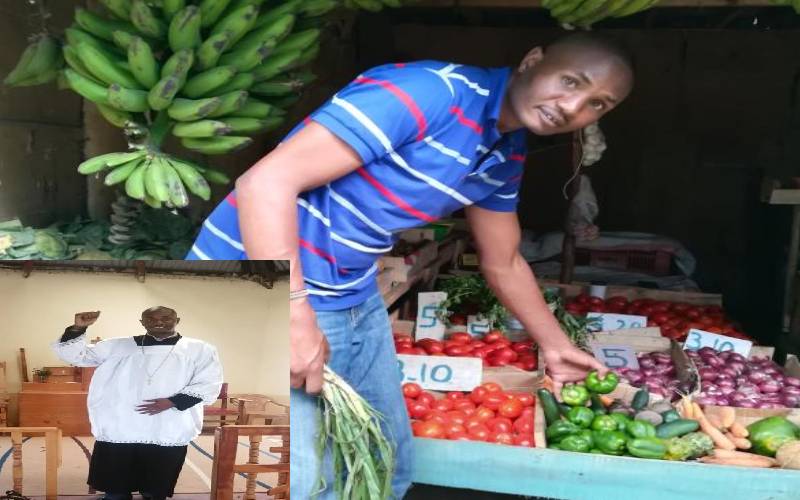
Joseph Kiama at his Kibanda. INSET: The pastor in his church. [Pkemoi Ng’enoh]
Joseph Kiama Wambugu, the senior pastor at African Independent Pentecostal Church, was leading a normal life and supporting his young family from his church salary.
That was until March 2020 when the coronavirus brought everything to a standstill – in Kenya. The pandemic led to the closure of schools, bars and places of worship as the government battled to curb the spread of the virus.
Like many Kenyans whose sources of income evaporated into thin air due to job losses and collapsing businesses, men of cloth whose sole means of livelihood was from the offerings and tithes of their flock, found themselves in a desert of empty pockets and hoping for manna. Worshippers could no longer afford to give generously, as they too were praying for a miracle. In any case, church attendance had been suspended by the government.
“Initially, we thought preachers would be spared, but by April, the salaries we used to earn stopped coming because worshippers were no longer attending church. That’s when the reality hit me,” Kiama told The Nairobian.
Read More
No plan B
All along, Kiama has been living in Nairobi and survived on his savings and church salary. He would frequent his upcountry home to spread the word of God. But when things went south, he settled for selling groceries at Kingston area in Nairobi’s Lunga Lunga slums to cushion himself against the unforgiving city life.
“Like many pastors, I did not have a Plan B. So I decided to sell vegetables because at the end of the day, we have to eat and survive. Soon, I realised I was earning much more from my kibanda than what I used to get from my church salary,” he said.
Kiama has since cut down the time he spends at church.
“I commute to my church for a two-hour service only on Sundays then I come back to my kibanda. It is sad that many preachers, who used to be paid by their churches, are languishing in poverty because they don’t want to be seen doing such odd jobs,” he said.
Kiama served at the Kirurumi church in Nyeri but is currently leading Mapema church based in Kimahuri parish. He says his calling to serve God started at an early age, leading to him ultimately being ordained.
New life as a vegetable vendor
On weekdays he is among the first traders who flock Wakulima Market in the morning hours for fresh produce before heading back to his stall to serve his customers.
At his kibanda, he sells all kind of fruits and vegetables – from carrots, onions, tomatoes to bananas, retailing at between Sh5 and Sh100.
“I see myself doing this business for a long while. It is well paying and will also enable me to complete my theology course,” said Kiama.
He says pastors are human like anybody else.
“We are not special. We also face challenges like everyone else when not on a preaching mission. Sometimes we don’t have airtime or even sugar at home. This has been a wakeup call. You should not be afraid of starting afresh, from the bottom or small,” he advises.
Credit: Source link